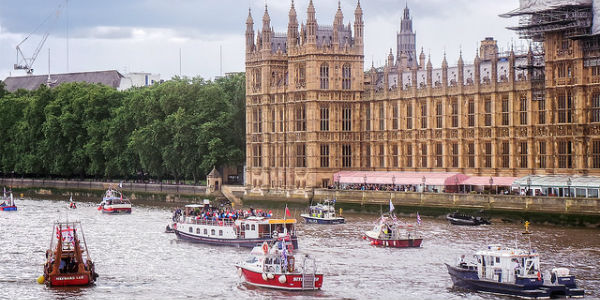Referendums, though they may be political lifeboats, can be very bad for democracy
Britain has an uncodified constitution. No one is exactly clear – when is it proper for a government to hold a referendum? In the absence of clarity, all seek to take advantage, to the detriment of well-functioning democracy. Consequently, while referendums may be treated as political lifeboats, they can be very bad for democracy, argues Peter Wiggins.

Leave and remain supporting boats during the EU Referendum, 2016. Picture: Garry Knight, public domain
‘Boris Johnson has told friends that a “no” vote is desirable because it would prompt Brussels to offer a much better deal, which the public could then support in a second referendum. [Sunday Times, 28 June 2015, Tim Shipman]
“[A second referendum would be a] disastrous mistake that would lead to permanent and ineradicable feelings of betrayal,” he said. “Let’s not go there.” [Boris Johnson, 14 February 2018, speech on Brexit to Policy Exchange]
The 1975 referendum, which gauged whether the electorate supported the government’s campaign to stay in the European Community, was Britain’s very first referendum. The Labour Party was bitterly split on Europe, and by calling a national referendum, prime minister Harold Wilson aimed to heal the divide. Wilson, who had himself negotiated the terms of British entry to the European Community, won the vote. Wilson would later claim that the referendum provided “a lifeboat into which the whole Labour Movement could clamber.”
The story of 2016 is not very different. David Cameron had pledged to negotiate a new deal with the European Union and to call a referendum on EU membership on such new terms as he got. He sought once and for all to silence the Eurosceptic rebels in his party. For Cameron too, then, the referendum was a lifeboat, albeit a faulty one. Having lost the referendum, he resigned as prime minister.
Calling a referendum, it turns out, does not have anything, in particular, to do with constitutional principle. Rather, it’s about party management and political strategy.
Nor, it would seem, is a referendum a particularly good way of settling an issue. The ’75 referendum certainly didn’t settle the issue of Europe for long. Nor did the 2016 referendum: in its aftermath, the proposition that “the final deal will have to go back to the people” has built up a head of steam. The pro-European Liberal Democrats included in their 2017 manifesto a commitment to put the government’s deal to a vote of the British people in a referendum “with the alternative option of staying in the EU on the ballot paper”.
For sure, it is now the remainers we can expect to see campaigning for another referendum. But in fact it’s not so long ago that one rather prominent Leave campaigner was making the same case. In June 2015, the fiercely anti-European Union Dominic Cummings, who went on to run the Vote Leave campaign, argued on his blog, that a second referendum on the deal would offer comfort to those inclined to vote leave but nervous of doing so. As he put it, “it seems likely that the parties will be forced by public opinion to offer a second vote, and therefore this could be turned to the advantage of NO.” Cummings was at least being honest at this point.
The blog made a bit of an impact. For the sake of his own ambition, Boris Johnson took up the idea for about ten minutes. And some political commentators got a bit excited. Simon Jenkins for one was keen. A second referendum, he argued in his Guardian column could “let a new Europe take root”.
At the time, many remainers laughed the idea away. This was the stuff of fantasy, surely. Ex-prime minister Cameron saw no chance of a new lifeboat – holding another vote “was not remotely on the cards”, he said. But remainers are no longer laughing. Now they cite recent polling, which suggests there is popular support for another referendum “on the deal”. Constitutional specialist Vernon Bogdanor seems to think it likely: he wrote in the Guardian, “In March 2019, Tories may well come to the view that there is a stronger case for another referendum than they currently believe.”
Will Britain have another referendum? We might note that the bookies’ odds keep shortening, but it is very hard to know. It is also very hard to know what exactly the electorate would be asked if there was another referendum. Would it be simply “deal” (i.e. the government’s negotiated deal) versus “no deal”? If the electorate voted “no deal”, then would we need yet another referendum – “remain” versus “WTO rules”? Or would the second referendum include, as the Liberal Democrats wish, the option to “remain”? But wouldn’t that seem to undermine the result of the 2016 referendum? At any rate, if it were possible to vote remain, then it would have to be known that Article 50 can be revoked. And so far, no court has been willing to judge on that. So actually, it is not clear whether we can escape Brexit; nor, however, is it clear that any particular version of Brexit has a parliamentary majority. What was conceived as a lifeboat is proving to wreck the ship.
Paradoxical though it might seem, referendums can be very bad for democracy
What a mess the 2016 EU referendum has made – and what a further mess a second referendum could yet make. The report “Brexit and public opinion” by The UK in a Changing Europe shows how the 2016 referendum has become symbolic of all those issues Britons are divided on. Political identity in the United Kingdom is more and more bound up with the European Union. Increasingly citizens see themselves as “leavers” or “remainers”. This, the report argues, has the potential to profoundly disrupt our politics in the years to come. A second referendum can seem most unwise. Paradoxical though it might seem, referendums can be very bad for democracy. They pit citizens against one another. By prioritising some areas of policy (for example, the European Union) above others (for example, the NHS), they can sap the life out of politics. Since 24 June 2016, nearly all government business appears to have been in a quasi-permanent state of ‘on hold’. Determined as they are to lead with Brexit, the media underplay important stories, letting Brexit dominate. And referendums, by impacting different parts of the country in different ways, can lead to regional resentment. Northern Ireland is no doubt the country most greatly affected by Brexit. Yet 56% of its population voted against.
If it seems as though the politicians and campaigners are making it up as they go along, then that’s because they are. In the Briefing Paper for the 2016 Referendum Bill, MPs were told, ‘The UK does not have constitutional provisions which would require the results of a referendum to be implemented’. Yet the British public were told, in a leaflet sent to every household in the country, “This is your decision. The Government will implement what you decide”. Referendums expose cynicism too. The Liberal Democrats were against the referendum held in 2016; but, having lost it, they now want one. Meanwhile, Mr Cummings and Mr Johnson were in favour of a second referendum; but having won the 2016 vote, they are now against.
If the UK must be a home to national referendums, there are so many important issues that need to be addressed, and the UK would surely do well to codify its constitution. As things stand, no one is clear – when is it proper for a government to hold a referendum? Are there issues on which governments should be required to hold a referendum? And we might ask about thresholds for turnout and/or for the needed majority, as is common in other established western democracies. We might want to consider requiring that for a change to take place via a referendum that all four of the UK’s nations give it some minimum level of support.
It’s too late to avoid the present mess. But let us not be ruled by misjudged opportunism in the future.
This article gives the views of the author, and not Democratic Audit. It was originally published by LSE Brexit.
About the author

Peter Wiggins has a B.A. in Politics from the University of Sussex and a postgraduate diploma in Economics from the School of Oriental and African Studies. For the last five years, he has worked in public affairs and stakeholder engagement, and he currently works as a consultant at a small charity, the Learning Skills Foundation.





 Democratic Audit's core funding is provided by the Joseph Rowntree Charitable Trust. Additional funding is provided by the London School of Economics.
Democratic Audit's core funding is provided by the Joseph Rowntree Charitable Trust. Additional funding is provided by the London School of Economics.
Excellent analysis.
According to the Government, the top “British” value is democracy. But it doesn’t say what democracy is, why we need it or how to get it. Because they don’t know or would rather not say.
But then does or can academia answer those questions. On a limited search, I see no strong evidence. So I’ll try my hand.
Why do we need democracy? Because it’s the only way of resolving the differences of opinion of individuals within a society.
How do we get it?
1. We acknowledge that every one of us has our own unique set of values, beliefs and opinions.
2. We accept that those opinions are valid.
3. Then to resolve differences of opinion, democracy gives everyone’s opinions equal power to direct the government and make the rules of their society.
Conclusion: referendums fail on 1, 2 and 3. They are not democratic.
But worse still, they are a two-alternative forced choice. Choose A or B. But forget X Y or Z and all points in between. So no nuanced choices.
They are by their nature oppositional. The two sides develop the behaviour of gangs, taking to extremism, populism and tribalism.
So yes we do need a constitution which sets out the rules for referendums.